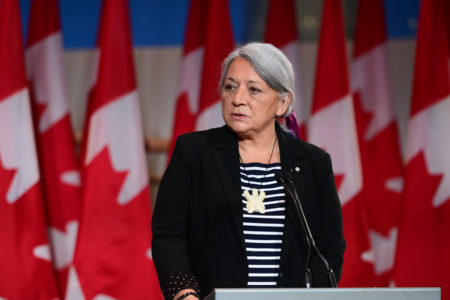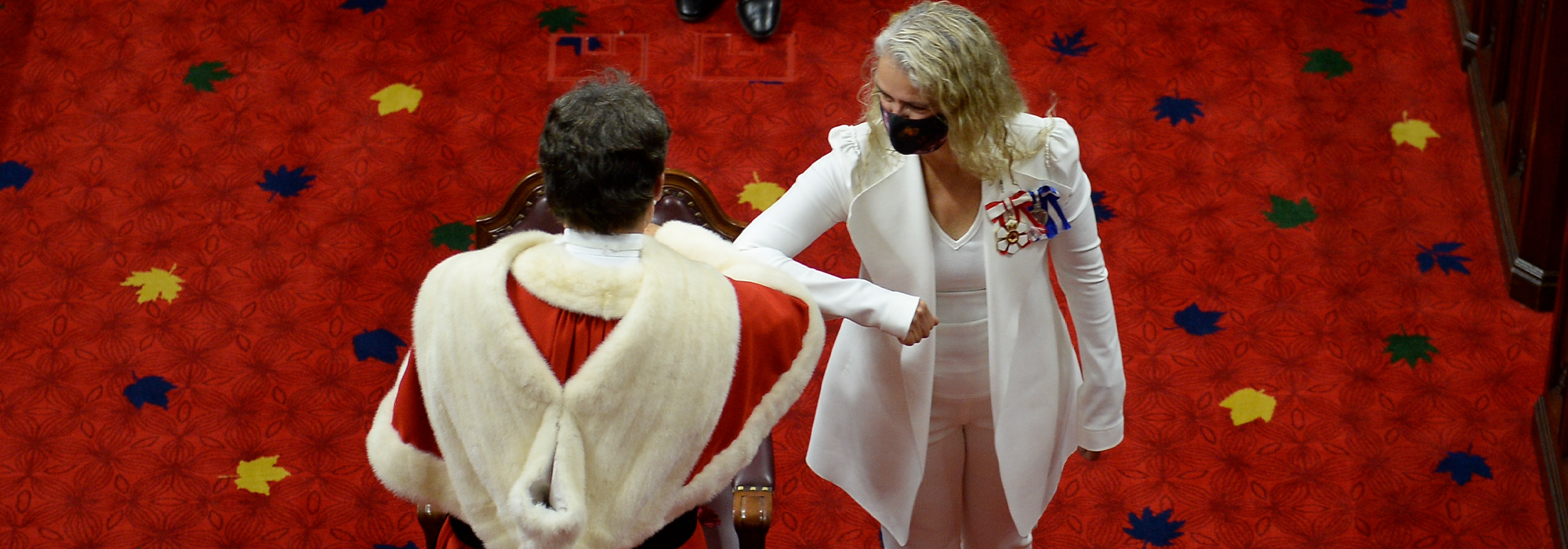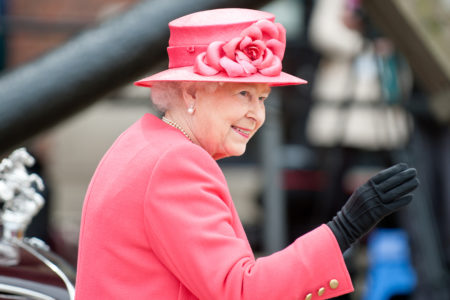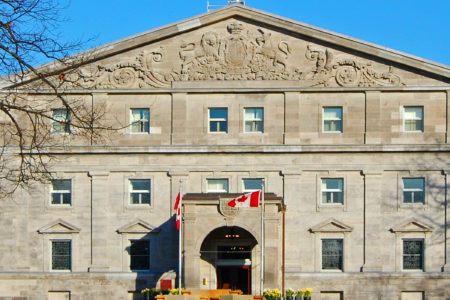
Governor General Julie Payette’s 21 January 2021 resignation ends a problem-plagued tenure and offers an opportunity for reflection on the role. The denouement came after the completion of a third-party review examining the workplace culture at Rideau Hall after allegations that Payette and her secretary, Assunta Di Lorenzo, a close personal friend, consistently bullied and harassed staff. Payette expressed concerns amid summer media reports by CBC’s Ashley Burke of verbal abuse of staff, but did not offer her resignation until she had seen the independent review, which has not yet been publicly released.
Dominic LeBlanc, president of the Queen’s Privy Council for Canada, said the resignation “is in the best interest of the institution and the country.” He added: it “allows the employees of Rideau Hall to have an appropriate workplace, and it allows a renewal of the leadership of this important institution.”
Payette’s resignation was almost certainly at Prime Minister Justin Trudeau’s request, although neither Trudeau nor LeBlanc would confirm that. A simple statement that Payette had resigned is the course most in keeping with the dignity of the office. Had Payette refused to step down, Trudeau would have had to seek her removal by the Queen. There was no other option.
Payette’s statement of resignation adopted the all-too-common passive phrasing that avoids any admission of culpability – she noted that “tensions have arisen” at Government House. She also cited face-saving personal reasons for her departure, her father’s failing health.
In Canadian terms, the events are unprecedented, although an early departure is not. Governors general do not always serve five years. Some have served as little as three, others more than seven, and we do not always know the reasons why a term might be shortened. In the post-Confederation era, illness and death have interrupted some tenures: both Baron Tweedsmuir (1935-40) and Georges Vanier (1959-67) died in office. Roméo LeBlanc (1995-99) resigned early because of poor health. At times in the pre-Confederation era, Canada had a truly alarming vice regal mortality rate.
The office can never be effectively vacant. In the distant past, the commander of the Forces served as interim administrator; now the chief justice of Canada’s Supreme Court serves that function. Especially in times of minority government, it is essential that Canadians have confidence that someone is in place to fill the Crown’s essential role with impartiality and good judgment, and there is every reason to think that the Right Honourable Richard Wagner will do that.
Other Commonwealth episodes offer comparative perspective. The most germane would be the 2003 resignation of Australia’s governor general, Peter Hollingworth. As Anglican archbishop of Brisbane, Hollingworth allegedly mishandled allegations of sexual abuse by clergy. A resolution passed without division in Australia’s Senate stating that he had “shown himself not to be a person suitable” to hold the office, and calling for Hollingworth’s resignation. Fortunately, Payette’s resignation was not forced by overt legislative debate, which it might well have done had she resisted the inevitable. The Crown is too important an institution to be tainted by an incumbent’s wish for personal vindication.
In most other Commonwealth cases, controversies surrounding the Governor General have been less about the Governor General’s personal misdeeds and more about embroilment in partisan politics. Episodes of that sort have arisen: in Antigua and Barbuda in 2014, in Tuvalu in 2013, and repeatedly in Papua New Guinea, among other examples. Historians, however, tend to attach less significance to such comparisons than do political scientists. This is because, even within shared Westminster traditions, each Commonwealth nation has its own political culture and history that inform the context of any dispute.
In Canada, the 1926 King-Byng affair is the most conspicuous example of a political vice regal controversy. More recently, British Columbia’s lieutenant governor, Judith Guichon, was compelled to refuse then-premier Christy Clark’s advice for a dissolution of the legislature when Clark found she was unable to sustain its confidence after the 2017 election. In that instance, Guichon correctly permitted the opposition to attempt to form a government, which it successfully did, rather than resorting to an election mere weeks after the previous one.
These episodes are controversial because they involved the rare use of the prerogative of refusal of ministerial advice, a prerogative some observers erroneously maintain has lapsed. More commonly, such as in periodic controversies over requests for prorogation, the representative of the Crown has accepted ministerial advice. But the infrequency of the use of these reserve powers is no measure of their persistence in our constitution; reports of their death – which indeed date back to the 19th century – have been greatly exaggerated.
The representative of the Crown is not a mere figurehead. Instances in which leaders resist accepting the verdict of the legislature are rare, but they are not unheard of.
These rare episodes point up the essential purpose of the Crown: to ensure that there is always a legitimate government in power, one that enjoys the confidence of the elected body – in essence, to preserve democracy. Our Westminster system separates the functions of head of state and head of government for that very reason. The representative of the Crown is not a mere figurehead. Instances in which leaders resist accepting the verdict of the legislature are rare, but they are not unheard of.
The Payette episode raises inevitable questions about the vice regal selection process. In 2010, then-prime minister Stephen Harper established an ad hoc advisory committee to recommend a successor to the popular Michaëlle Jean. The excellent choice of David Johnston proved the merits of the system, and in 2012 Harper’s government announced that such a committee would be permanently relied upon to recommend territorial commissioners, lieutenant governors, and the Governor General.
An abortive private member’s bill, C-569, introduced in 2014 by Conservative MP Scott Reid, sought to systemize the selection process further, even as the bill acknowledged that the advice tendered by the committee would not be binding on the prime minister, and that the prerogative of the monarch to appoint and remove vice regal representatives would remain unaffected. The bill specified that, after vetting, the name to be recommended to Her Majesty would be announced to the House of Commons for debate.
An open discussion of the advice the prime minister intends to tender to the Queen would, of course, make the Queen’s prerogative of refusal moot. There is virtually no chance that the Queen would indeed refuse after the inevitable behind-the-scenes consultation, but this very consultation, along with the traditional discreet cross-partisan discussion, essentially reduces any House of Commons debate over a selection to mere political theatre. More recently, other observers have proposed similar open debate over proposed names, to which the same objections could be raised. This sits uneasily in a political culture that prioritizes transparency, but there are sound reasons why we have historically opted to keep the Crown beyond the reach of the partisan fray.
Trudeau was not obligated to use Harper’s comparatively new innovation to select the Governor General when he named Payette. And it is understandable that the opportunity to appoint someone with such stellar credentials would tempt one to impatiently sweep aside tiresome procedure. It is probable Trudeau followed the long-established custom of presenting opposition leaders with his choice in advance of the announcement; both Andrew Scheer and Tom Mulcair greeted the announcement with approval. That said, only his government is responsible for clear failures to note a personal history that included allegations of mistreatment of employees in former workplaces including the Montreal Science Centre and the Canadian Olympic Committee. These should have been a deal-breaker for such an appointment.
Despite a comparatively short trial, the non-partisan Advisory Committee on Vice-Regal appointments seems a logical step forward in Canada’s tradition of gradual constitutional evolution, and will help us to choose carefully in future.
The Payette episode, if nothing else, should teach us that the brightest and most accomplished Canadian may not be a fit as Governor General. The high expectations we have of our Crown representatives, the heavy demands of a constantly public life in which one’s gracious dignity must never flag, the sound judgment needed to navigate often-ambiguous constitutional circumstances and to serve as a personal manifestation of the Crown’s treaty relationship with First Nations, require a rare combination of virtues.
And, by all means, let’s ensure that the appointee taking on this burden knows what it involves. Continuity in staff is essential rather than permitting an uninformed new appointee to unwisely appoint a personal friend to the senior staff post at Rideau Hall, as Payette did. A Gary Clement cartoon at the time of Payette’s 2017 appointment lampooned a common misperception: in answer to Payette’s query about what she would have to do in the job, the cartoon Trudeau answers, “nothing.” Let’s make sure our next Governor General knows better.
Gov.Gen. Julie Payette bumps elbows with Chief Justice Richard Wagner as she arrives for the throne speech in the Senate chamber in Ottawa, Wednesday, Sept.23, 2020. THE CANADIAN PRESS/Justin Tang








